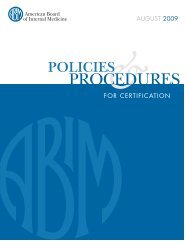The SRA Symposium - College of Medicine
The SRA Symposium - College of Medicine
The SRA Symposium - College of Medicine
Create successful ePaper yourself
Turn your PDF publications into a flip-book with our unique Google optimized e-Paper software.
Papers<br />
How Administrators Can Help the Process and How the Process Helped Me<br />
Understanding the process makes facilitating the process easier. Participating in the process<br />
increases insight. Understanding and insight are useful tools to possess when tasked with writing<br />
research agreements, preparing proposals and managing subcontracts. Being part <strong>of</strong> the process<br />
has helped me step back and reevaluate some <strong>of</strong> the preconceptions I have had.<br />
Not all collaborators are the same; not all institutions are the same. Some institutions, just like<br />
some individuals, respond more quickly than others. Collaborators are not always friends nor do<br />
they always like each other personally but they may respect each other pr<strong>of</strong>essionally. Sometimes it<br />
is a “marriage” driven by necessity rather than desire.<br />
It may not be a startling revelation but not everyone agrees and not everyone works at the same<br />
pace, but it is a fact that is easily forgotten. Waiting for input from one or more <strong>of</strong> my collaborators<br />
has made me aware <strong>of</strong> how frustrating it can be for a researcher in another institution to be<br />
waiting for my <strong>of</strong>fice to issue a subcontract so that they can begin their work. <strong>The</strong> prompt issuance<br />
<strong>of</strong> a subcontract can be very helpful to maintaining cordial collaborative relationships. Since<br />
these relationships can be new, tenuous, starting the relationship on a note <strong>of</strong> discord can be very<br />
counterproductive. As my esteemed colleague, Dr. Peter M. Gr<strong>of</strong>fman, <strong>of</strong>ten reminds me, ”A little<br />
kindness really helps the wheels <strong>of</strong> the world spin more smoothly!”<br />
As Research Administrators, we need to do our part to ensure that we facilitate the process, not<br />
impede the process. Negotiating a subcontract, for example, is not a competition where one<br />
administrator or institution wins and another loses. If it is not a win/win situation in which the<br />
rights <strong>of</strong> all parties, including the funding agency, are protected, then it may become a lose/lose<br />
situation for everyone.<br />
No time is wasted when administrators take the initiative to step out <strong>of</strong> their role to gain insight<br />
into the problems and to understand the complexities <strong>of</strong> colleagues. <strong>The</strong> rewards outweigh the<br />
effort and the insight gained is priceless. However, it takes individual initiative to do this – to reach<br />
beyond a “process the paper” approach in order to attain a feeling <strong>of</strong> ownership in the outcome.<br />
Conclusion<br />
Of course, collaborations among people can be done without institutional involvement. All that<br />
is needed is the desire, the need and the trust. However, when a transfer <strong>of</strong> money is involved,<br />
especially federal money, an institutional framework is necessary because institutions have multiple<br />
responsibilities. <strong>The</strong> challenge is to provide a helpful and supportive framework that does not<br />
impede progress or insert unnecessary burdens. A good Research Administrator rises to this challenge<br />
and accepts it as a routine part <strong>of</strong> the job!<br />
Collaborations can be a frequent source <strong>of</strong> problems (Magnus, Kalichman, 2002; Likens, 2001)<br />
due to their varying forms and complex nature. Misunderstandings, unproductive collaborators,<br />
authorship issues, data analysis disagreements can singly or collectively taint the relationship.<br />
While communication and understanding are key ingredients, a Research Administrator who is<br />
attuned to the process can be invaluable. Being part <strong>of</strong> a collaborative group helps one to appreciate<br />
the importance <strong>of</strong> flexibility, a key ingredient in any collaboration as well as a desirable quality<br />
in a good administrator. Constructing a good agreement, making sure that the statement <strong>of</strong> work<br />
received in the proposal stage is clear and is agreed to by the parties involved, expediting paperwork<br />
as quickly as possible and maintaining a cordial relationship with collaborating institutions<br />
can help strengthen the relationship. Collaborations do not stop with the researchers involved in<br />
the project; they include the institutional administrators that manage for them.<br />
246 2005 <strong>Symposium</strong> Proceedings Book

















